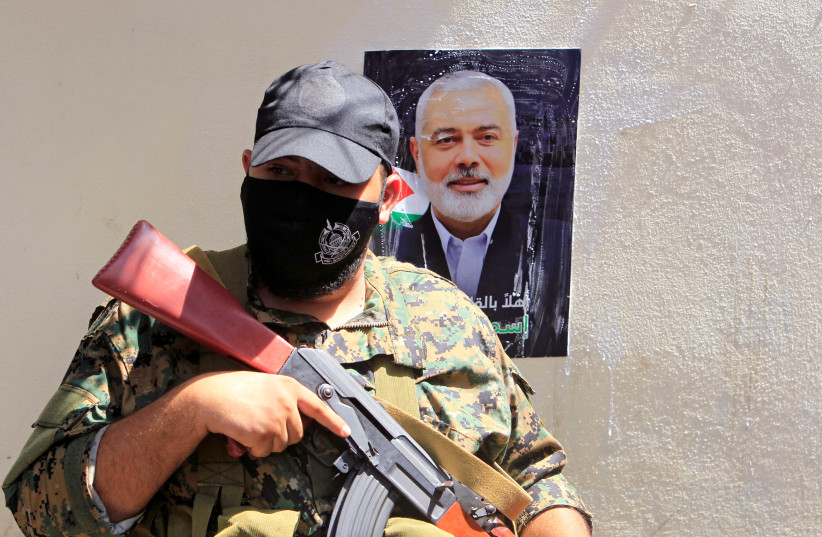Hamas chief Ismail Haniyeh blamed Israel for a lack of progress in achieving a ceasefire deal in Gaza, the Palestinian enclave's ruling terrorist group said in a Saturday statement on Telegram.
Haniyeh added that Hamas "has responded all the time in a positive spirit and high responsibility with the mediator brothers in order to stop the aggression against our people, end the unjust siege, and allow the flow of aid, shelter, and reconstruction.
Haniyeh also claimed that "The movement has shown complete flexibility in dealing with these issues, but it is clear so far that the occupation continues to maneuver and procrastinate in the files. Which concerns our people, while his position revolves around the release of prisoners held by the resistance."
In the previous ceasefire, Hamas released 40 hostages, who were kidnapped during their October 7 terror attack, in exchange for 120 security prisoners held in Israel over terror offenses.
Notably, during the last ceasefire, Hamas and Palestinian Islamic Jihad continued to launch rockets toward Israel, and terrorists affiliated with the organization carried out a terror attack at a bus stop in Jerusalem. Hamas also continued to attack Israeli forces as officials held a ceasefire extension talk.
Despite the claim that Hamas has been acting "flexibly" in negotiations, Haniyeh asserted that "The resistance will not accept anything less than a complete cessation of aggression, the withdrawal of the occupation army from the Gaza Strip, the lifting of the unjust siege, the provision of safe and appropriate shelter for the displaced and displaced due to the crimes of the occupation, the return of the displaced, especially to the north of the Gaza Strip, an end to the barbaric starvation policy, and a commitment to reconstruction."

Humanitarian crisis in Gaza
While humanitarian aid has been entering Gaza, the United Nations has claimed they are struggling to distribute the aid. Additionally, evidence has shown that Hamas has been stealing aid intended for civilians.
Palestinian civilians in Gaza have been internally displaced, as have many Israeli civilians who live close to the border. The evacuation of cities and villages within Gaza has been a tool used by the IDF to minimize civilian casualties. Despite this, Hamas has repeatedly been accused of using civilian shields to continue its terrorist activity.
"Achieving a prisoner exchange deal through which our prisoners, especially the old ones and those with high sentences, will be released is one of the goals of these negotiations, and this cannot be skipped," Haniyeh insisted.
"The movement deals with the ongoing negotiations in a positive spirit and high responsibility, but it will not neglect the great sacrifices of our people and the achievements of their valiant resistance.
"We will work with all available means to stop the bloodbath carried out by the enemy around the clock against our defenseless people."
Israel's terms for a ceasefire
Last week Israeli Prime Minister Benjamin Netanyahu rejected a ceasefire proposal from Hamas, insisting that anyone would say no to the conditions.
“Surrendering to the delusional demands of Hamas ..will not lead to the release of the hostages. It will only invite another massacre,” Netanyahu said, referencing the October 7 attack against southern Israel in which over 1,200 people were killed and over 250 were seized as hostages.
Netanyahu has repeatedly insisted that the terms for a ceasefire would be an end to Hamas's control over the Gaza Strip and the release of all the hostages.
Hamas officials have publicly stated their intention to repeat the October 7 terror attack.
“I would like to emphasize again - there is no other solution than total victory. If Hamas survives in Gaza, it is only a matter of time until the next massacre,” Netanyahu stressed.
“The evil axis of Iran and its affiliates will continue unhindered its campaign of killing and aggression,” Netanyahu explained.
“We have no obligation to the crazy terms Hamas is talking about.. including the part about [releasing terrorists] with “blood on their hands,” Netanyahu said, stressing that “we have not committed” to that.
Netanyahu continued by insisting that there is supposed to now be “a process of negotiation through mediators but from what I have seen, Hamas is not there.”
The Jerusalem Post reported a month ago that Yahya Sinwar had refused Israel's terms for a complete end to the Gaza war. Sinwar reportedly sent messages expressing his readiness for the conflict to be extended for an unforeseeable amount of time, rejecting Israel's terms that a new government should take over the strip and the hostages should be freed.
Tovah Lazaroff and Reuters contributed to this report.
